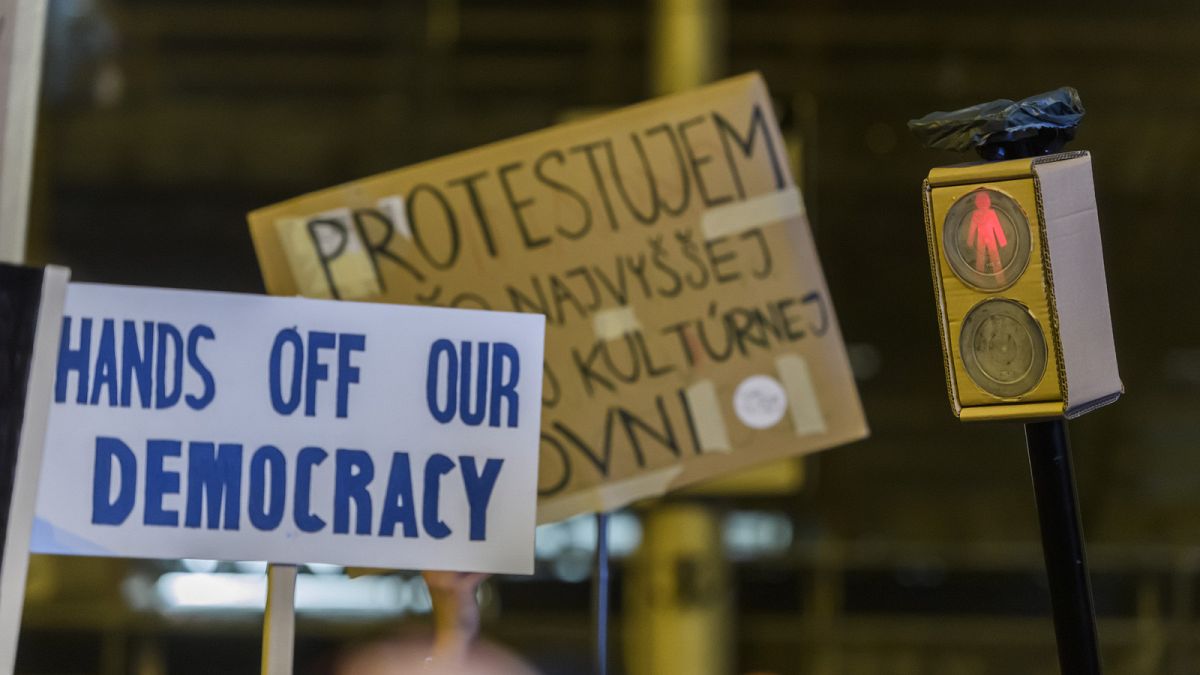The Slovak opposition is calling on Brussels to hold the government in Bratislava accountable for recent controversial decisions. Thousands of protesters have taken to the streets of Bratislava to denounce government actions that they say are eroding the rule of law and democratic freedoms in the country. Recent events including the dismissal of directors from cultural institutions, the release of a former special prosecutor, and the proposed disbanding of the National Crime Agency have sparked outrage and led to calls for a no-confidence vote in parliament.
The protests in Bratislava have drawn attention to what organizers describe as an attack on Slovak democracy by the government. Opposition politicians are pushing for extraordinary parliamentary sessions and a potential vote of no confidence in key ministers. While the ruling coalition holds a majority in parliament, there are signs of discontent within the government ranks. Protesters are demanding that the European Union intervene to protect the principles of the rule of law and democracy in Slovakia.
Prime Minister Robert Fico has faced mass protests in the past, and recent demonstrations highlight concerns about democratic backsliding since his return to power. Fico has pursued controversial judicial reforms and faced criticism over his handling of the public broadcaster. While Brussels has refrained from punitive measures against Slovakia, experts warn that the EU may find it increasingly difficult to ignore the erosion of democratic norms in the country. Recent government actions are seen as a direct challenge to the institutions of the state and may force the European Commission to take action.
The European Commission has been cautious in its approach to the Slovak government, but recent events have raised concerns about the erosion of democratic norms. The Commission will need to navigate the delicate balance between legitimate criticism of the government’s actions and personal attacks against political leaders. With mounting pressure from protesters and opposition politicians, as well as growing discontent within the government itself, the Commission may be forced to address the situation in Slovakia sooner rather than later. The future of democracy and the rule of law in Slovakia hangs in the balance, and Brussels will need to act decisively to uphold these fundamental principles.
The recent protests in Bratislava mark a significant moment in Slovakia’s democratic history, with thousands of citizens taking to the streets to defend their rights and freedoms. The opposition is calling on the European Union to intervene and hold the government accountable for its actions, which are seen as an assault on Slovak democracy. As pressure mounts on Prime Minister Fico and his coalition partners, both within the government and from external actors, the future of Slovakia’s democratic institutions hangs in the balance. The coming weeks will be critical in determining whether the country can reverse the trend of democratic backsliding and uphold the values of the European Union.
In the face of mounting protests and calls for accountability, Prime Minister Fico and his government are under increasing scrutiny both at home and abroad. Recent events, including the dismissal of cultural institution directors, the release of a former special prosecutor, and the proposed disbanding of the National Crime Agency, have raised concerns about the erosion of democratic norms in Slovakia. The European Commission will need to carefully navigate the situation and determine the appropriate response to ensure the protection of democracy, the rule of law, and fundamental freedoms in the country. The coming days and weeks will be crucial in determining the future of Slovakia and its place within the European Union.










